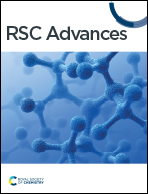Spontaneous and site-specific immobilization of PNGase F via spy chemistry†
Abstract
Protein N-glycosylation plays a critical role in a wide range of biological processes, and aberrant N-glycosylation is frequently associated with various pathological states. For global N-glycosylation analysis, N-glycans are typically released from glycoproteins mediated by endoglycosidases, primarily peptide N-glycosidase F (PNGase F). However, conventional N-glycan release by in-solution PNGase F is time-consuming and nonreusable. Although some immobilization methods can save time and reduce the enzyme dosage, including affinity interaction and covalent binding, the immobilized PNGase F by these traditional methods may compromises the immobilized enzyme's stability and biofunction. Therefore, a new approach is urgently needed to firmly and steadily immobilize PNGase F. To meet this demand, we have developed a spontaneous and site-specific way to immobilize PNGase F onto magnetic nanoparticles via Spy chemistry. The magnetic nanoparticles were synthesized and modified with SpyTag as a solid surface. The PNGase F fused with SpyCatcher can then be site-specifically and covalently immobilized onto this solid phase, forming a firm isopeptide bond via self-catalysis between the SpyTag peptide and SpyCatcher. Importantly, the immobilization process mediated by mild spy chemistry does not result in PNGase F inactivation; and allows immobilized PNGase F to rapidly release various types of glycans (high-mannose, sialylated, and hybrid) from glycoproteins. Moreover, the immobilized PNGase F exhibited good deglycosylation activity and facilitated good reusability in consecutive reactions. Deglycosylation of clinical samples was completed by the immobilized PNGase F as fast as several minutes.



 Please wait while we load your content...
Please wait while we load your content...